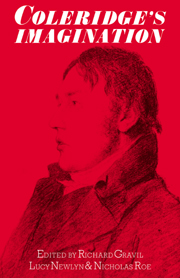Book contents
- Frontmatter
- Contents
- Pete Laver: a memoir
- Abbreviations
- Introduction
- Romantic imagination, nature and the pastoral ideal
- ‘The infinite I AM’: Coleridge and the Ascent of being
- Struggling with the contingent: self-conscious imagination in Coleridge's notebooks
- Coleridge's rejection of nature and the natural man
- The imagination of Mrs Samuel Taylor Coleridge: unknown inspiration of an unknown tongue
- ‘As much diversity as the heart that trembles’: Coleridge's notes on the lakeland fells
- ‘Leaping and lingering’: Coleridge's lyrical ballads
- ‘Radical Difference’: Coleridge and Wordsworth, 1802
- Imagining Wordsworth: 1797–1807–1817
- The Otway connection
- Imagining Robespierre
- Coleridge's Dejection: imagination, joy and the power of love
- Imagining naming shaping: stanza VI of Dejection: an Ode
- Mythopoesis: the unity of Christabel
- The languages of Kubla Khan
- Notes on the contributors
- Index
‘Leaping and lingering’: Coleridge's lyrical ballads
Published online by Cambridge University Press: 04 August 2010
- Frontmatter
- Contents
- Pete Laver: a memoir
- Abbreviations
- Introduction
- Romantic imagination, nature and the pastoral ideal
- ‘The infinite I AM’: Coleridge and the Ascent of being
- Struggling with the contingent: self-conscious imagination in Coleridge's notebooks
- Coleridge's rejection of nature and the natural man
- The imagination of Mrs Samuel Taylor Coleridge: unknown inspiration of an unknown tongue
- ‘As much diversity as the heart that trembles’: Coleridge's notes on the lakeland fells
- ‘Leaping and lingering’: Coleridge's lyrical ballads
- ‘Radical Difference’: Coleridge and Wordsworth, 1802
- Imagining Wordsworth: 1797–1807–1817
- The Otway connection
- Imagining Robespierre
- Coleridge's Dejection: imagination, joy and the power of love
- Imagining naming shaping: stanza VI of Dejection: an Ode
- Mythopoesis: the unity of Christabel
- The languages of Kubla Khan
- Notes on the contributors
- Index
Summary
One of the most colourful volumes of literary scholarship ever given to the world is a study of the working of Coleridge's imagination, ‘an absorbing adventure along the ways which the imagination follows in dealing with its multifarious materials – an adventure like a passage through the mazes of a labyrinth, to come out at last upon a wide and open sky’. Now more than half a century old, The Road to Xanadu was composed in a style that has rather fallen out of fashion. Hardly any smart critics today write even like G. Wilson Knight, and post-structuralism has cultivated its own arcane splendours of language to overshadow the rococo magnificence of Xanadu's mesmerizing rhetoric. Celebrated for a generation at Harvard with a Gilbertian tribute –
My name is John Livingston Lowes;
I'm a dealer in magical prose –
Lowes offered accounts of the poet's imagination of such spellbinding authority that we listen like a three-year's child while the critic has his will:
The ‘deep well of unconscious cerebration’ underlies your consciousness and mine, but in the case of genius its waters are possessed of a peculiar potency. Images and impressions converge and blend even in the sleepy drench of our forgetful pools. But the inscrutable energy of genius which we call creative owes its secret virtue at least in part to the enhanced and almost incredible facility with which in the wonder-working depths of the unconscious the fragments which sink incessantly below the surface fuse and assimilate and coalesce.
- Type
- Chapter
- Information
- Coleridge's ImaginationEssays in Memory of Pete Laver, pp. 102 - 116Publisher: Cambridge University PressPrint publication year: 1985



